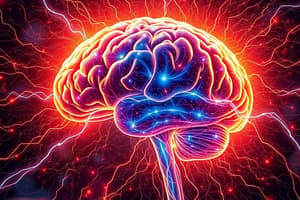Podcast
Questions and Answers
What does neuroplasticity refer to?
What does neuroplasticity refer to?
- The brain's capacity to rewire and reorganize neural connections (correct)
- The brain's inability to form new connections
- The brain's inability to strengthen existing connections
- The brain's inability to change and adapt
Which subfield of neuroscience focuses on the structural organization of the nervous system?
Which subfield of neuroscience focuses on the structural organization of the nervous system?
- Neurophysiology
- Neuroanatomy (correct)
- Neuroplasticity
- Neurotransmitters
How does neuroplasticity play a role in mental health?
How does neuroplasticity play a role in mental health?
- Neuroplasticity can help treat addiction, anxiety, and depression (correct)
- Neuroplasticity has no impact on mental health
- Neuroplasticity only relates to physical health
- Neuroplasticity can cause addiction, anxiety, and depression
What is the primary focus of neurophysiology?
What is the primary focus of neurophysiology?
What is the primary function of glutamate as a neurotransmitter?
What is the primary function of glutamate as a neurotransmitter?
Which imaging technology has revolutionized the study of brain activity and structure?
Which imaging technology has revolutionized the study of brain activity and structure?
What is the primary role of dopamine in the nervous system?
What is the primary role of dopamine in the nervous system?
Which disorder is characterized by damage to the protective covering of nerve fibers?
Which disorder is characterized by damage to the protective covering of nerve fibers?
What process is the study of neurophysiology primarily concerned with?
What process is the study of neurophysiology primarily concerned with?
Which neurotransmitter is primarily responsible for memory, learning, and muscle function?
Which neurotransmitter is primarily responsible for memory, learning, and muscle function?
Flashcards are hidden until you start studying
Study Notes
Neuroscience: Shaping Our Understanding
From the intricate connections of our brains to the complex chemical communications between cells, neuroscience is a multidisciplinary field that continues to uncover the mysteries of the human mind. In this article, we'll dive into the subtopics that have significantly shaped our understanding of the nervous system, and the work that continues to advance our knowledge.
Neuroplasticity
Neuroplasticity, also known as brain plasticity, refers to the brain's ability to change and adapt in response to new experiences, learning, and injury. This capacity to rewire and reorganize neural connections presents a unique characteristic of our brains that allows us to learn, heal, and adapt to our environments. Neuroplasticity has been studied in various contexts, such as:
- Learning and memory: Our brains' capacity to form new connections and strengthen existing ones through experience and practice.
- Rehabilitation: The brain's ability to rewire after injury, supporting recovery from traumatic brain injury and stroke.
- Mental health: Exploring the potential for neuroplasticity to help treat conditions like addiction, anxiety, and depression.
Neuroanatomy
Neuroanatomy is the study of the structural organization of the nervous system, including the brain's regions, connections, and cell types. Significant milestones in neuroanatomy include:
- The development of the Golgi stain, which made it possible to visualize individual neurons and their connections.
- The discovery of brain regions, each with its unique function, such as the cerebellum, hippocampus, and cortex.
- Advances in imaging technologies, like magnetic resonance imaging (MRI) and positron emission tomography (PET), which have allowed scientists to study brain activity and structure in unprecedented detail.
Neurophysiology
Neurophysiology is the study of the electrical and chemical processes in the nervous system, focusing on the function of individual neurons and neural networks. Key insights in neurophysiology include:
- The discovery of the action potential, which is the electrical signal that propagates along neuronal axons.
- The development of electroencephalography (EEG), which measures brain activity and has been used to study various conditions like epilepsy and sleep disorders.
- The discovery of neurotransmitters, chemical messengers that transmit signals between neurons, and their roles in various functions and diseases.
Neurotransmitters
Neurotransmitters are the chemical messengers that convey information between neurons. They are involved in various aspects of our lives, from our moods and emotions to the way we move and perceive the world. Some key neurotransmitters include:
- Glutamate: The primary excitatory neurotransmitter.
- Gamma-aminobutyric acid (GABA): The primary inhibitory neurotransmitter.
- Dopamine: Involved in reward, motivation, and movement.
- Serotonin: Involved in mood, sleep, and appetite.
- Acetylcholine: Involved in memory, learning, and muscle function.
Neurological Disorders
Unfortunately, not all aspects of the nervous system function perfectly. Neurological disorders are conditions that affect the brain, spinal cord, and nerves, and they encompass a wide range of conditions. Some examples of neurological disorders include:
- Parkinson's Disease: A progressive disorder that affects movement, leading to tremors and difficulty walking.
- Alzheimer's Disease: A degenerative brain disorder that causes memory loss and cognitive decline.
- Epilepsy: A disorder characterized by recurrent seizures.
- Multiple Sclerosis: A chronic inflammatory disease that damages the protective covering of nerve fibers, leading to various symptoms.
As our understanding of the nervous system continues to grow, so too does our ability to treat and prevent neurological disorders. From the development of new neuroimaging techniques to the discovery of novel therapeutic targets, the future of neuroscience promises to bring exciting advancements for the benefit of humanity.
Studying That Suits You
Use AI to generate personalized quizzes and flashcards to suit your learning preferences.




